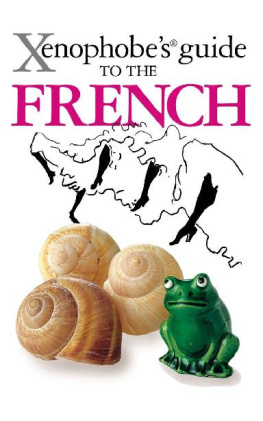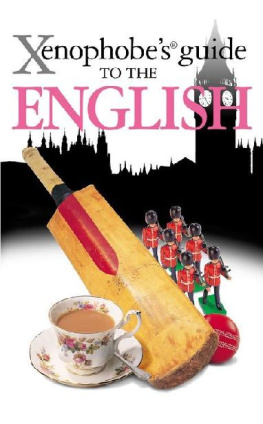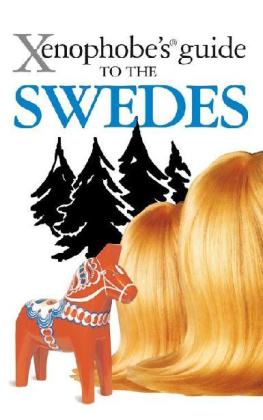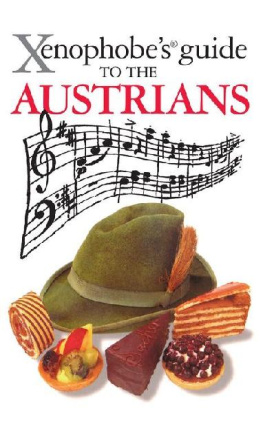Nick Yapp - The Xenophobes Guide to the French
Here you can read online Nick Yapp - The Xenophobes Guide to the French full text of the book (entire story) in english for free. Download pdf and epub, get meaning, cover and reviews about this ebook. City: London, year: 2008, publisher: Oval Projects, genre: Detective and thriller. Description of the work, (preface) as well as reviews are available. Best literature library LitArk.com created for fans of good reading and offers a wide selection of genres:
Romance novel
Science fiction
Adventure
Detective
Science
History
Home and family
Prose
Art
Politics
Computer
Non-fiction
Religion
Business
Children
Humor
Choose a favorite category and find really read worthwhile books. Enjoy immersion in the world of imagination, feel the emotions of the characters or learn something new for yourself, make an fascinating discovery.
- Book:The Xenophobes Guide to the French
- Author:
- Publisher:Oval Projects
- Genre:
- Year:2008
- City:London
- Rating:5 / 5
- Favourites:Add to favourites
- Your mark:
- 100
- 1
- 2
- 3
- 4
- 5
The Xenophobes Guide to the French: summary, description and annotation
We offer to read an annotation, description, summary or preface (depends on what the author of the book "The Xenophobes Guide to the French" wrote himself). If you haven't found the necessary information about the book — write in the comments, we will try to find it.
The Xenophobes Guide to the French — read online for free the complete book (whole text) full work
Below is the text of the book, divided by pages. System saving the place of the last page read, allows you to conveniently read the book "The Xenophobes Guide to the French" online for free, without having to search again every time where you left off. Put a bookmark, and you can go to the page where you finished reading at any time.
Font size:
Interval:
Bookmark:


The French see brilliance in everything they do, and French statesmen from the Renaissance to de Gaulle and on to Chirac have likened France herself to a guiding light.
The French population is 64 million compared with 42 million Spanish, 52 million English, 58 million Italians, 82 million Germans and 307 million Americans.
The French care about what really matters in life being French. They care more about doing everything with enormous style than about what they do. They are convinced of their corporate and individual superiority over all others in the world. Their charm is that they dont despise the rest of us: they pity us for not being French.
Their charm is that they dont despise the rest of us: they pity us for not being French.
The notion of la force lies at the heart of everything the French have done, well or badly, in the last thousand years or more. La force is their sense of the essence of life. It is bound up with other grand ideas such as la gloire and la patrie , feminine words that speak of boundless stores of energy. The French are attracted to all things vibrant, alive, moving, irresistible. Beneath their chic and natty appearance they respond to atavistic and primitive impulses.
Where most other nations would be embarrassed or appalled by the notion of the thinly veiled body of Marianne (the symbol of the French Republic) leaping over the barricades, musket in hand, the French are moved to tears of real patriotism. The cockerel may well be their national symbol a colourful male bird that makes a great deal of noise, chases off all rivals and lays no eggs but they never forget that their country is la France.
This is why they are a sensual people: who kiss where others shake hands; who proudly say that they make love in the same way that they eat; who write music that sounds like the sun rising out of the sea. And its also why they are so concerned with appearances , taking seven and a half minutes to wrap a small tarte aux cerises putting it in a box, tying it with ribbon and handing it to the customer as though it were a new-born baby when the blessed thing is going to be consumed the moment its taken out of the ptisserie .
They are a public, unembarrassed people, made for special occasions banquets, weddings, festivals, ftes.
They are a public, unembarrassed people, made for special occasions banquets, weddings, festivals, ftes. Here they perform, happy in their roles and the overall production. In their homes, they are too cabined, cribbed, confined. The settings in which they are best seen are offices, restaurants, airport lounges (who else looks good in these?) opera houses, and grands boulevards. They may sometimes behave badly, but they always act superbly.
The French see themselves as the only truly civilised people in the world. Long ago they discovered the absolutes, the certainties of life, and thus they feel they have a duty to lead and illumine the rest.
On anything that matters they consider themselves experts. Anything in which they are not experts does not matter. All life, all energy, is a grand force of nature, which they embrace whole-heartedly. They see glory in what others regard as defeat. Since they have won almost every war they have entered, they assume that the final battle must have resulted in a French victory. Because of this, the French who visit England and happen to travel through Waterloo Station wonder why the British named it after a battle they lost.
Their role in relation to the rest of the world borders on the Messianic.
They also see honour in seduction, triumph in a well-cooked entrecte, and world supremacy in a bottle of grand cru . Not for nothing was Louis XIV called the Sun King, for the French see brilliance in everything they do, and French statesmen from the Renaissance to de Gaulle and Chirac have likened France herself to a guiding light. Their role in relation to the rest of the world borders on the Messianic.
To give their own feeling of superiority some validity, the French are generously prepared to accept that other nations have to exist. But do not expect the French to be politically correct in anything they do. They can be racist, chauvinistic and xenophobic, but always with great charm, and whereas the English would feel guilty for having such sentiments, the French believe that its natural.
They find the Spanish proud but noisy, and believe they produce more wine than is healthy for the vineyards of the Midi. Although Spanish wine may be substandard to the taste buds of the French, a existe an ominous phrase
They find the Spanish proud but noisy, and believe they produce more wine than is healthy for the vineyards of the Midi.
They see the English as small-minded, uncultured, faintly ridiculous, badly dressed; a nation of people who spend most of their time gardening, playing cricket and drinking thick, sweet, warm beer in pubs. Yet they remain curious about them. They may refer to English day-trippers to Calais as les fuck-offs and still regard the British generally as perfide (because the French jury is still out on the little matter of whether or not Napoleon was poisoned while on St. Helena). The Scots are viewed in an entirely different light: apart from their historic ties, they supply malt whisky.
The French dont dislike the Germans but they are not fond of them. They are willing to acknowledge their industrial supremacy but regard their culture as inferior to their own. This is not discrimination. In their view, every other culture is inferior to their own. They also feel politically superior to the Germans since the Germans lost all international presence when they were stripped of their colonies after the First World War. The French may no longer own much of the world, but French law, language and culture persist in every continent.
The French may no longer own much of the world, but French law, language and culture persist in every continent.
Despite their reservations and however uncomfortable they find the thought, the French have much in common with the Germans a sense of formality, a reserve, a concept of racial purity, a belief in an historical destiny.
The exceptions to this admiringdisliking axis are the Swiss and the Belgians. The Swiss are objects of merciless satire in French television commercials. They may be hospitable, but they are obsessively clean and speak French in a most odd fashion.
Because the French value style in everything they do, they have contempt for the Belgians, who they see as universally dull and totally lacking in finesse. To the French, the Belgians have always been bte , thick, and they are the butt of an endless stream of French jokes, e.g:
Two Belgian soldiers are sleeping under a tree.
Suddenly a terrible rumbling sound awakes them.
Hell and death, says the first. A storm!
No, says the other, those are bombs.
Thank God for that, says the first. Im terrified of thunder.
A little envy has crept into these jokes now that the French realise the Belgians have a better standard of living than they do.
Historically, the French have had a special relationship with the United States and Canada, having owned much of the former and populated much of the latter. But complications have arisen. When a French film is shown at a French-Canadian cinema it has to have subtitles because the Canadians cannot understand the soundtrack, their accent is so different.
Font size:
Interval:
Bookmark:
Similar books «The Xenophobes Guide to the French»
Look at similar books to The Xenophobes Guide to the French. We have selected literature similar in name and meaning in the hope of providing readers with more options to find new, interesting, not yet read works.
Discussion, reviews of the book The Xenophobes Guide to the French and just readers' own opinions. Leave your comments, write what you think about the work, its meaning or the main characters. Specify what exactly you liked and what you didn't like, and why you think so.













